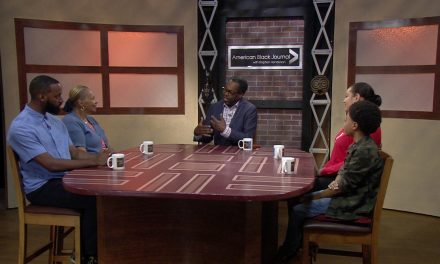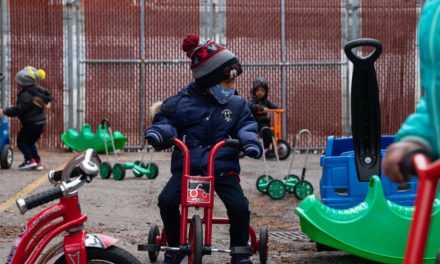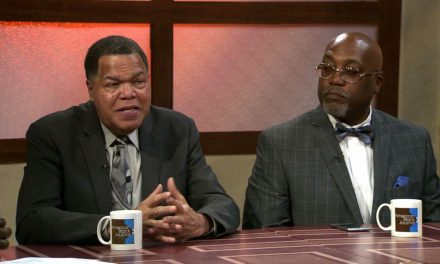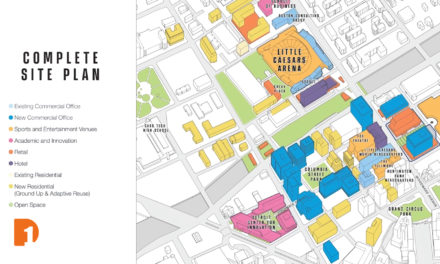How does gun violence affect communities of color on a daily basis? FORCE Detroit, a nonprofit organization focused on finding creative solutions to combat gun violence and building a safer Detroit, brings together interfaith, grassroots and public sector leaders to have difficult conversations about complex issues in the community.
RELATED: 15th Annual Silence the Violence March Rallies to Stop Gun Violence in Detroit
RELATED: Detroit Mayor Mike Duggan, Police Chief James White on Violence, Crime and Policing in Detroit
FORCE Detroit Director Alia Harvey Quinn joins “American Black Journal” host Stephen Henderson for an in-depth conversation about how communities of color are affected in the aftermath of violent gun crimes. Plus, she talks about building relationships and establishing a new normal for those likely to be involved in violent crimes.
Full Transcript:
Stephen Henderson, American Black Journal Host: It’s one of the issues the nonprofit organization FORCE Detroit is really focusing on as it works to build a safer, freer city. The group brings together interfaith grassroots and public sector leaders to have the difficult conversations about complex issues in our community and to develop creative solutions. I spoke with FORCE Detroit’s director, Alia Harvey Quinn.
So I’m actually really eager to talk to you about this. Given all of the things that are going on right now with gun violence in our country. But I think it’s an important time to remind people that while these mass shootings are really disturbing and they are not an acceptable part of American life; that for those of us who live in places like Detroit, those of us who are part of the African-American community.
Stephen Henderson: Gun violence is a fairly regular part of life for far too many of us. And it’s not episodic like these mass shootings. It’s day to day. And I know that at FORCE Detroit, that’s what you’re really focused on, is changing that. Changing that for us in our communities.
Alia Harvey Quinn, Director, FORCE Detroit: Yeah, unfortunately, violence has become a normal part of way too many poor and oppressed people of cultures of color, day-to-day lives. And so that has forced us to find solutions that are unique and creative, out of the box. Those solutions have become, over the years, evidence-based, tried and true solutions.
Alia Harvey Quinn: And across the country, we’ve been working to implement them. You know, I’m tied up with a network of organizers and organizations that do violence interruption. So it is important to remember in a moment like this that black and brown communities have been dealing with violence for years, epidemic levels of violence for years.
Alia Harvey Quinn: And that our young people are learning violence as the new normal. And that we have victims that are embedded in community, that are suffering with grief and unable to escape it because it’s happened over and over and over. And solutions are healing and they need to be publicly resourced and so forth.
Stephen Henderson: Yeah. Let’s talk about how you have to approach this issue in a city like Detroit. I get kind of tired of the argument about whether it’s guns or whether it’s environment or social structure. It’s not an either-or. It’s both, and. And I know that you are focused on, again, both of these things. You’ve got to, you’ve got to solve it at every turn.
Alia Harvey Quinn: Yeah, yeah. No, I appreciate that. Because usually in these types of segments, there is not time to nuance these conversations. Right. Like black people are concerned with the fact that a five-year-old got shot in the face twice on Evergreen about a month ago. And we are also concerned with the fact that there’s another five-year-old in the same neighborhood going home to a household without his parent or his or her parent due to incarceration.
Alia Harvey Quinn: And so, like, there’s a very narrow spectrum of expertise that can help us solve for violence without further incarcerating our over-criminalized community. It’s important. It’s important to just say that we got to recognize the expertise of the community, and the lived experience of peacemakers. Yes, sir.
Stephen Henderson: Mm-hmm. And so let’s talk about how those solutions play out in a city like Detroit. I think a lot of people from the outside, especially look at the violence in a city like Detroit and say, “Oh my gosh, I don’t know what you would do. It seems unsolvable.” What are your focus points?
Alia Harvey Quinn: Yeah. So literally building relationships that help us challenge the cultural standard of violence is the only way out of this. And that is relationships at every level. We need to be building relationships with the community of faith so that there is renewed hope, right? So that we are setting higher standards. We need to build relationships with peacemakers so that they can and so that they can stop violence in the moment.
Alia Harvey Quinn: We need to be building relationships with high-risk, likely, and probable shooters, so that we can transition them out of that lifestyle and meet the trauma, the traumatic needs that are causing the violence in the first place. We need to build relationships with victims so we can help that healing situation happen.
Alia Harvey Quinn: And we need to be building relationships with our young people so that they know that this is not how we should live so that we’re raising the next generation we’re creating a new sort of standard.
Stephen Henderson: You know, the best way, of course, to do this, especially with young people, is to give them agency over these kinds of things. To train them and their leaders, you know, to spread this message. But that’s also one of the hardest ways to do this, of course, because they’re young people.
Stephen Henderson: Talk about how you reach both kids who are at risk to send them in another direction but then also identify young people who can be powerful voices for these messages.
Alia Harvey Quinn: Yeah. So I think, like, if we’re honest with ourselves, seasoned professionals don’t. We just don’t. Like we have to trust credible messengers on the ground who have transitioned out of those lifestyles but have retained their relationships, use those relationships for peace.
Alia Harvey Quinn: And I think one of the problems is that we sort of— We try to box this up. We want this to look like a normal nonprofit. We want it to be cutesy and follow the trends. And I just left out of a retreat and as out of the box as we already are, the people who are at the center of the trauma are saying, we need you to meet us closer to where we are, Alia. And I thought, I thought I was doing a good job.
Stephen Henderson: Yeah. Now that’s hard. So give us a sense of the march that you recently participated in and whether you feel like we’re.. Are we winning this battle? And I know that’s kind of a clichéd way to think about it, but are we headed in the right direction? And do marches like that give you the sense that there is appeal and power behind what you’re doing?
Alia Harvey Quinn: Yeah. So let me tell you what I love about the organizing work of the Church of the Messiah and Pastor Barry and the Silence the violence parade overall. I love the fact that there are so many very, very passionate peacemakers all in the same space, all with different models. When these models intersect, there’s a great, great deal of tension usually.
Alia Harvey Quinn: But at this march, there is, you know, one voice, one band, one sound. We’re all trying that, we are acknowledging that we really all have the same sort of self-interest to see Detroit be a safer and freer city. And we all show up in harmony. Like, I just love that.
Alia Harvey Quinn: I mean, so it’s always like a reunion of sorts because everybody, there’s a small community of folks that do this work really intensely and everybody knows each other. COVID has isolated us. It’s just good to grab hugs and be with people in a shared space with a common mission.
Stephen Henderson: Yeah. Yeah.
Alia Harvey Quinn: Yeah.
Stephen Henderson: And from there, I would imagine there’s this sense of momentum, right? That the work flows from, from that energy.
Alia Harvey Quinn: No sir. Because unfortunately people have to choose and there are so many like brilliant peacemakers, right? Like shout out to Teferi Brent. Shout out to Minister Malik Shabazz to Ortega’s Jackson, to the organizer Daryl Woods. There are so many peacemakers who could be in this space full time who are just not.
Stephen Henderson: Who aren’t? Oh, wow.
Alia Harvey Quinn: We have not, we have not carved out public allocations to resource this work. And it’s heavy. The expenses are heavy. Right. Relocating an active shooter is going to be expensive. Right. If there’s somebody who, you know, we have an inside track that he or she may be robbing people to meet their basic needs. Right. Meeting their basic needs may be expensive. Right.
Alia Harvey Quinn: Training folks for employment. And I don’t mean like these light-hearted, let me help you get a resumé like programs. I really mean if you have somebody who is trusting you to take him or herself from a point where, you know, in which they identified jobs as countercultural to who they actually are. Right. They may not have grown up in a household with their mom and their dad watching them sort of go to work, do the routine, come home, wind down, sit down for dinner. Right.
Alia Harvey Quinn: That would be establishing a new norm for him or her. Right. And so, the socialization of that process is gradual and intense and it’s heavily based on relationships and on trust. Right. And so, like even me, I’m not directly working in the streets. I don’t have the expertise to do that, right? What I can do is lend the nonprofit infrastructure to the people who do have the expertise; build deep relationships with them, and trust them to show up as their best selves.
Stephen Henderson: Yeah. Yeah. Well, congratulations, of course, on the work. And obviously, it’s really vital to solving this problem. Thanks for being with us here on American Black Journal.
Alia Harvey Quinn: Yeah, thank you for having me.
Stay Connected:
Subscribe to Detroit Public Television’s YouTube Channel & Don’t miss American Black Journal on Tuesday at 7:30 p.m and Sunday at 9:30 a.m. on Detroit Public TV, WTVS-Channel 56.
Catch the daily conversations on our website, Facebook, Twitter and Instagram @amblackjournal.
View Past Episodes >
Watch American Black Journal on Tuesday at 7:30 p.m. and Sunday at 9:30 a.m. on Detroit Public TV, WTVS-Channel 56.




